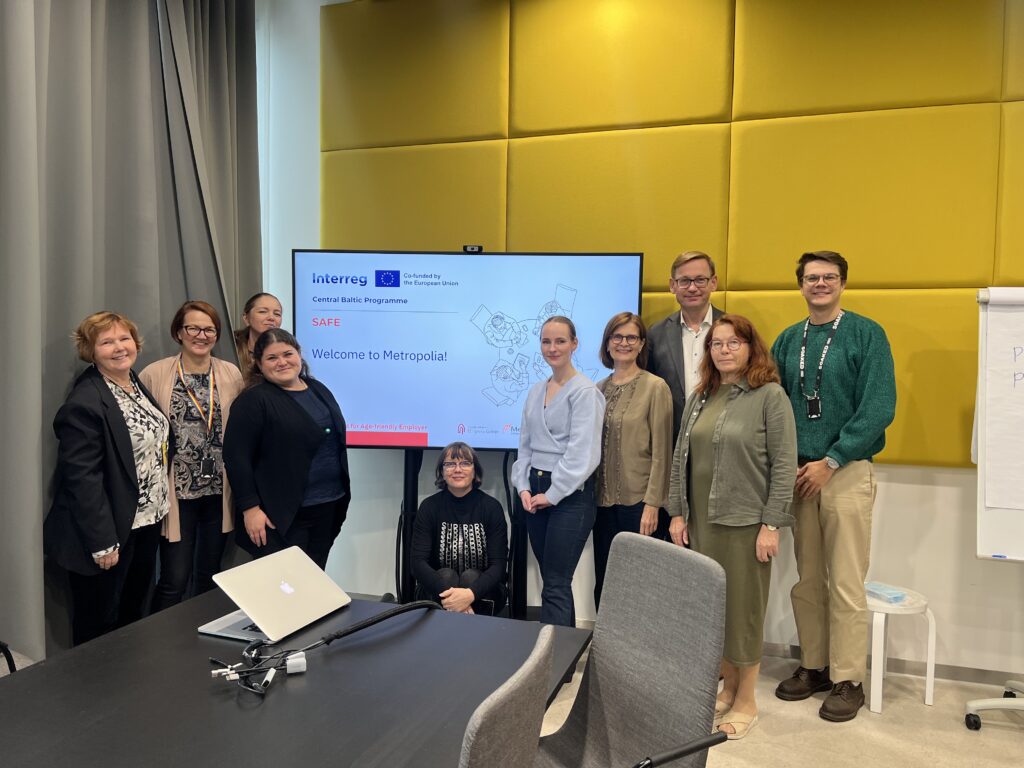How to assess age-friendliness in health and care sector workplaces?
On 4-5 November 2024, the partners from the project “Solutions for Age-Friendly Employers – SAFE” gathered in Helsinki to advance the development of an age-friendly workplace self-assessment tool. Over two intensive days, the partners explored innovative age-management practices, with presentations from the Finnish start-up Nextmile and students at Metropolia University of Applied Sciences. By the end of the workshop, the partners had crafted a preliminary set of indicators for assessing age-friendliness in health and care sector workplaces.
Nextmile unlocks the potential of senior workers
The SAFE project has partnered with the Finnish start-up Nextmile to enhance support for senior employees towards the end of their careers. CEO and Founder Antti Harjuoja kicked off the co-working days with a presentation on pre-retirement management, describing it as a strategy to extend careers and enrich the years when individuals approach their retirement age.
Harjuoja emphasised the importance of early, open communication between senior employees and managers regarding retirement plans and potential work adjustments. He acknowledged that, while retirement discussions are often sensitive, they are essential both for the employer and the senior employee.
Nextmile has joined the SAFE project team to help develop effective age management practices. The company’s expertise in the topic is invaluable to the SAFE project’s mission of fostering age-friendly workplaces.

Metropolia students propose fresh solutions for age-friendly practices
This Autumn, students from the Metropolia University of Applied Science’s Minno project course have been tasked to develop practical solutions addressing staffing shortages in the health and care sector, with an emphasis on age-friendly management practices. During the workshop, the students presented two ideas that they have developed through the Minno course: peer coaching led by a trained professional to ease workplace challenges and career path conversations between employees and employers at various career stages.
These ideas will be used as an inspiration for the SAFE model for age-friendly employers. Additional student projects will contribute further innovation proposals throughout the academic year.
Developing the age-friendliness self-assessment tool
Inspired by the insights from both Nextmile and the Metropolia students, the SAFE partners began defining indicators for the age-friendliness self-assessment tool. Partners analysed the current landscape of the health and care sector in Estonia, Finland, and Sweden, noting rising employment rates among older workers, especially women aged 60-65, in this sector. Despite cultural and system-level differences, all three countries face similar challenges with the ageing workforce and the prevailing shortage of qualified staff.
Throughout autumn, the Finnish and Estonian project partners have held focus group discussions with health and care sector organisations to gather input about the current age management practices and to explore areas in need of improvement. Simultaneously, the Swedish partner has conducted a literature review to understand the current pre-retirement policies, age management practices, and attitudes toward the older healthcare workforce in Sweden. This groundwork allowed the partners to outline key themes and indicators for the upcoming self-assessment tool.
The next phase of the SAFE project involves developing and testing the tool within health and care sector organisations in Estonia, Finland, and Sweden, with pilots planned for Spring 2025.
The “Solutions for Age-Friendly Employer (SAFE)” project joins four partners from Estonia, Finland, and Sweden. The cooperation aims to strengthen and improve employment opportunities for senior workers aged 55+ specifically focusing on the health and wellness sectors. The project is financed by the European Regional Development Fund through Interreg Central Baltic 2021-2027.
